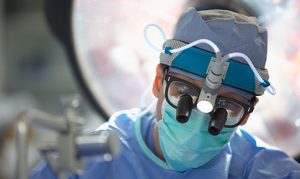 In the past, Barrett’s esophagus could be a frustrating condition. With fewer treatment options available to them, patients were often told to “wait and see” while doctors monitored their symptoms. Today, new technologies offer restored hope for sufferers of Barrett’s. La Peer Health Systems in Beverly Hills is pleased to offer endoscopic radiofrequency ablation therapy (RFA) using the HALO System as a method of treating Barrett’s esophagus.
In the past, Barrett’s esophagus could be a frustrating condition. With fewer treatment options available to them, patients were often told to “wait and see” while doctors monitored their symptoms. Today, new technologies offer restored hope for sufferers of Barrett’s. La Peer Health Systems in Beverly Hills is pleased to offer endoscopic radiofrequency ablation therapy (RFA) using the HALO System as a method of treating Barrett’s esophagus.
While ablation therapy is not a new procedure, older technologies made it hard for doctors to destroy abnormal esophageal tissue without injuring nearby healthy tissue in the process. One of the benefits of the HALO System is that it provides surgeons with greater control and precision in removing injured tissue. If you’re interested in RFA, of if you would like to know more about Barrett’s esophagus, don’t hesitate to call (855) 360-9119 to schedule a consultation with one of the board-certified GI specialists at La Peer Health Systems in Beverly Hills.
Understanding Barrett’s Esophagus
A disorder affecting the esophageal lining, gastroesophageal reflux disease (GERD) and Barrett’s esophagus occurs when continuous exposure to stomach acid causes the cells in the lower esophagus to become damaged. Over time, changes in the color and composition of esophageal cells may lead to the development of esophageal cancer. Research indicates that people with Barrett’s disease are 40-130 times more likely to develop esophageal cancer than the general population. If you think you may be exhibiting symptoms of Barrett’s esophagus, it’s important to see a gastroenterologist to be tested for the disease.
Symptoms of Barrett’s Esophagus
Because Barrett’s sufferers often display few symptoms, the condition can be hard to diagnose. However, people should be alert to the following signs and symptoms:
- Persistent heartburn
- Trouble swallowing food
- Chest pain
- Pain in the upper part of the abdomen
- Dry cough
- Weight Loss
- Anemia
If you’re exhibiting one or more of the above symptoms, you may want to see a gastroenterologist about being tested for Barrett’s disease. The GI specialists at La Peer can perform an upper endoscopy to examine the esophageal tissue for signs of change. People with GERD may also want to consider being tested for Barrett’s.
How GERD Can Lead to Barrett’s Esophagus
Barrett’s esophagus may develop in people suffering from gastroesophageal reflux disease, or GERD. Because people with GERD experience a constant barrage of stomach acid in the lower esophagus, there is a greater chance of their esophageal cells undergoing change. We offer treatment options at La Peer that can help prevent GERD from developing into Barrett’s. If you’re suffering from GERD, you should not hesitate to undergo testing for Barrett’s esophagus.
Undergoing Endoscopic Radiofrequency Ablation (RFA) Therapy
The surgeons at La Peer perform endoscopic radiofrequency ablation therapy using the new HALO system as a means of removing pre-cancerous esophageal lining. With a Halo Ablative Catheter, our board-certified GI doctors will focus ablative energy on the pre-cancerous esophageal tissue. Once the unhealthy tissue has been destroyed, new, healthy tissue can grow back.
Performed on an outpatient basis, the procedure lasts about 30 minutes and does not require surgery or incisions. Evidence suggests that endoscopic RFA can actually help prevent patients from developing a fast-growing form of cancer called esophageal adenocarcinoma. If you would like to learn more about this potentially life-saving procedure, don’t hesitate to schedule an appointment at La Peer.
Frequently Asked Questions
Q: How long will it take me to recover after undergoing radiofrequency ablation?
A: La Peer offers RFA as an outpatient procedure at our Beverly Hills facility. While the procedure itself takes just thirty minutes, you will likely spend an hour or two in recovery. Once the sedation wears off, you will be free to leave the facility. Most patients resume normal activity immediately after undergoing RFA.
Q: When can I resume eating after RFA?
A: After undergoing RFA, you will graduate from a liquid diet to one that includes soft foods. You should be able to resume normal eating within a few days of having the procedure.
Q: Does insurance cover RFA?
A: Many plans do cover RFA. Check with your provider for details regarding your coverage.
Q: Are there any complications associated with RFA?
A: RFA is widely regarded as a safe procedure for treating Barrett’s Esophagus. However, you should be aware of the following rare complications: narrowing of the esophagus, bleeding, perforation of the esophagus or stomach, and infection.
Q: What is the cure rate associated with RFA?
A: Medical literature indicates published cure rates of 77-100%.
Contact La Peer Health Systems
If you’re concerned about Barrett’s Esophagus, you shouldn’t hesitate to call La Peer’s Gastroenterology Department at 855.360.9119 to schedule an appointment. You can also contact us for more information about this life-saving procedure for the treatment of Barrett’s disease.
For more information on Barrett’s Esophagus treatment options at La Peer, please visit BarrettsMD.com.
Next, read about Capsule Endoscopy.
